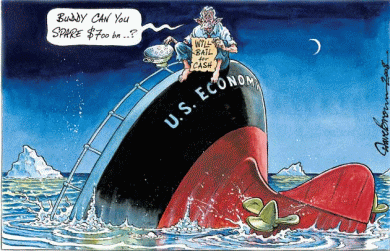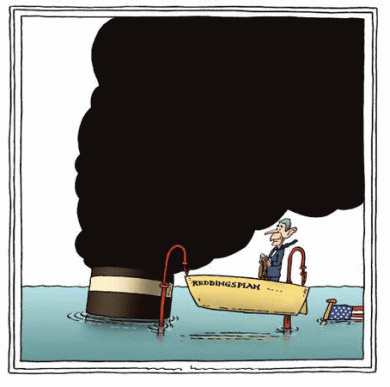
† [The Telegraph, U.K.]
China Daily, People's Republic of China
Must China Prepare
for End of American Financial Hegemony?
What could be more unnerving than having
your largest creditor begin pondering your financial demise? That might be the question
Americans ask themselves while perusing this op-ed article from China's
state-controlled China Daily. Ding Yifan, a
Chinese government researcher, ponders whether the world is witnessing the end
of U.S. global financial 'hegemony,' and complains that the Bush Administration
is letting banks such a Lehman Brothers fail - which had large amounts of
foreign investors - while saving banks with mostly U.S. investors. He closes
ominously with the question, 'what will we do with our rising foreign reserves?'
By Ding Yifan
September 26, 2008
People's
Republic of China - China Daily - Original Article (English)
The unfolding financial
crisis in the United States leads us to consider whether this signals the end
of that nation's long-established global financial hegemony.
The recent decision by the
Bush Administration to set up a government body to take over all financial debt
indicates its intention to rely on the market to cope with its current problems.
It is expected that the U.S. government will use any means necessary to protect
depositors and if the market proves inefficient, completely take over banks. But
it remains unclear whether the U.S. government can bring the ongoing crisis
under control.
But given their enormous
losses, foreign countries which invest in the United States are in fact the biggest
victims. With the widening of the subprime crisis, people expected the U.S.
government to offer a helping hand to teetering financial bodies - over and
above Bear Stearns. While the Bush Administration chose to inject much-needed
funds into certain financial bodies, it stood idly by and watched other like
Lehman Brothers fall apart.

[The Telegraph,
U.K.]
The American government has
its own criteria for determining what it should rescue. Because of the high level
of foreign investment in the firm, Lehman Brothers was left to its own devices.
As a result, foreign investors suffered more than their U.S. counterparts from
the collapse of this century-old financial body. As the crisis unfolds, more U.S.
financial institutions are expected to follow in Lehman's footsteps, with Asian
nations and oil exporters who hold large amounts of U.S. dollars expected to be
the greatest victims.
This isn't the first time
foreign investors have suffered tremendous losses due to an American financial
crisis. Japan was the chief victim, when the U.S. real estate bubble burst in
the 1980s. It is estimated that by the early 1990s, Japan had suffered losses
of around $70 billion, equivalent to its entire trade surplus with the United
States during the 1980s. The East Asian nation then fell into a 10-year
economic recession.
Posted by WORLDMEETS.US
It would be impossible for
developing countries which must absorb U.S. capital not to be affected by the
economic crisis engulfing that country. For instance, a number of American
corporations based in India are facing serious shortages of funds, prompting
them to withdraw capital from the Indian market and resulting in a steep
decline in the Indian stock market.
UNAVOIDABLE QUESTIONS
First of all, is this the end
of U.S. financial hegemony? In addition to the latest financial crisis, the United
States has experienced one other financial crisis since the turn of the century
- the bursting of its technological bubble [aka/the dot com bubble]. During
these two crises, many foreign investors have suffered heavy losses. Some
economists even warn that the this cyclical formation
of bubbles could seriously compromise the confidence of foreign investors in the
U.S. financial market.
Posted by WORLDMEETS.US

† [Het Parool, The Netherlands]
Question number two: What
losses have Chinese financial institutions suffered as a result of this crisis?
Available data show that Chinese institutions havenít acquired too many
mortgage-backed U.S. financial derivatives, so will therefore not suffer losses
that are too serious as a result of this crisis. So it's not possible that this
country will be plunged into an economic recession like Japan was during the 1980s.
Question three: Is this
crisis in the United States an opportunity for China to rush in and buy cheap
financial assets?
The outbreak of the latest U.S.
financial crisis, which is now spreading to other nations, shows that the neo-liberal
revolution launched during the 1980s has come to an end. At the time, a
campaign was launched in Western countries to ditch Keynesianism - which
advocates government intervention. Neo-liberalism called on market forces to be
given free reign and government controls to be scrapped, especially on financial
markets.
The problem is: What do we do
if Western countries abandon the neo-liberal model which includes in the
omnipotent role of the market? Will we continue to stick to the old development
model of using exports to drive our economic development? And if this is the
case, what will we do with our rising foreign reserves -caused by likely expansion
of the trade surplus?
*Ding Yifan
is an author and researcher with the State Council Development Research Center
[Posted by WORLDMEETS.US
September 27, 9:15pm]